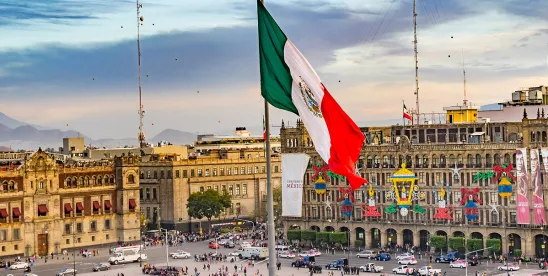On June 2, 2024, Claudia Sheinbaum was elected the next president of Mexico, marking a significant milestone in national politics and raising expectations and challenges for foreign trade in the country.
This GT Alert provides an overview of Sheinbaum’s proposals on foreign trade, as well as recent appointments to her cabinet and the implications for nearshoring.
International Trade Proposals
Claudia Sheinbaum Pardo has outlined a series of proposals aimed at strengthening Mexico’s position in international trade. Among the most relevant points to consider are:
- Strengthening the United States–Mexico–Canada Agreement (USMCA): Throughout her campaign, Sheinbaum consistently pledged to make the USMCA a fundamental pillar of Mexico’s economic growth. The review and update that the treaty will undergo in 2026, as well as U.S. elections, could significantly influence trilateral trade relations.
- Promoting Nearshoring: Following on the measures the current administration adopted, Sheinbaum proposes creating multiple “Poles for Wellbeing,” or strategic regions encouraging companies to relocate to Mexico and nearshoring. The proposal seeks to attract foreign investment and relocate global production chains to Mexico, reduce dependence on distant suppliers to improve the country’s competitiveness, and take advantage of Mexico’s potential as a destination for manufacturing and related services.
In this context, modernization projects such as the Interoceanic Corridor of the Tehuantepec Isthmus and the port infrastructure in Salina Cruz and Coatzacoalcos strive to turn Mexico into a key logistics hub, thereby facilitating intercontinental trade.
- Innovation and Development: On several occasions during her campaign and after the election, Sheinbaum spoke in favor of focusing Mexico’s energy transition on cleaner and more sustainable sources. This policy aims not only to reduce greenhouse gas emissions but also to guarantee a more competitive and reliable energy supply that would be crucial to attracting foreign investment.
Sheinbaum has also emphasized the importance of ongoing collaboration with academic institutions to develop educational and training programs that promote technological innovation in the Mexican manufacturing.
Meetings with the Private Sector
On the campaign trail and post-election, Sheinbaum has met with various chambers of commerce to discuss her plans and receive private-sector feedback. In these meetings, she has reaffirmed her commitment to transparency and collaboration to boost trade and foreign investment. In addition, she has discussed crucial issues such as tariff policies, facilitating trade, and integrating small and medium-sized enterprises (SMEs) into international markets.
Among the various institutions that have approached Sheinbaum, the Mexican Business Council for Foreign Trade, Investment and Technology presented her with several initiatives to improve Mexico’s international trade relations, including a request to simplify customs procedures using digital tools to improve import and export processes. The Council also requested logistics infrastructure improvements through investments in ports, airports, and land transportation to speed up and reduce the cost of transporting goods and make Mexican products more competitive in international markets.
In addition, the organization highlighted the importance of resuming and strengthening trade negotiations with countries such as Argentina, Brazil, South Korea, Ecuador, and the United Kingdom to diversify export and import markets and mitigate risks associated with dependence on certain trading partners.
Challenges: Legal Certainty and Markets
According to the official election results, the governing coalition secured a qualified majority of legislators in the Chamber of Deputies and is just a few seats short of achieving the same majority in the Senate. This would provide Sheinbaum’s political faction with practically all the required votes to amend the Constitution. The results took the markets by surprise, contributing to the volatility and weakening of the Mexican peso against the dollar. Investors and economic analysts have expressed reservations about the potential economic and legal impacts of various reforms Sheinbaum’s political faction has proposed.
These reforms include amendments that sitting President Andrés Manuel López Obrador has proposed regarding the anticipated disappearance and/or modification of several constitutionally autonomous institutions, including those overseeing fundamental issues such as elections, economic competition, access to information, protection of personal data, and energy related matters, among others. The proposed amendments have raised questions about potential institutional stability and legal certainty in Mexico.
In addition to the above, the reform that has attracted the most attention proposes electing judges, magistrates, and ministers by popular vote. The proposal would mean a structural change to the Federal Judicial Branch, and has generated uncertainty around the judiciary’s independence and autonomy, which could be an additional risk factor for investors and affect confidence in the Mexican market, thereby limiting opportunities for growth and economic development.
Key Cabinet Appointments
In the face of market concerns and the depreciation of the Mexican peso, Sheinbaum has already appointed to her cabinet recognized individuals to demonstrate her commitment to the economy, international trade, and strengthening investor certainty:
- Marcelo Ebrard: Appointed as Minister of Economy, Ebrard was selected for his experience as foreign minister and his contacts with senior U.S. officials to help strengthen Mexico’s international trade relations and foster foreign trade.
- Julio Berdegué: With an extensive career at the Food and Agriculture Organization of the United Nations (FAO), where he has held several positions, Berdegué will help develop the country’s agricultural policies as the head of the Ministry of Agriculture, Livestock, Rural Development, Fisheries and Food. His statements against genetically modified corn, the subject of controversy among USMCA members, are being considered by an independent panel established under the trade agreement.
- Rogelio Ramirez de la O: Retaining his seat as Minister of Finance, Ramirez de la O’s re-appointment seeks to reassure markets and ensure continuity in fiscal policy.
- Juan Ramón de la Fuente: The new Minister of Foreign Affairs served as dean of the National University and as Mexico’s representative before the United Nations, and it is hoped that his career in diplomacy and international relations will strengthen Mexican foreign policy.
Final Considerations
Claudia Sheinbaum’s presidency will introduce a new approach to Mexico’s international trade policy, with strategies to boost nearshoring and develop critical infrastructure to help the country prepare for the challenges and opportunities presented by the upcoming U.S. elections and the 2026 review of the USMCA.
Companies and international trade players should stay informed and adapt proactively to take advantage of the opportunities that may arise in this dynamic political and economic climate.
Given this backdrop, companies should consider reviewing and optimizing their trade policies and operations.




 />i
/>i

